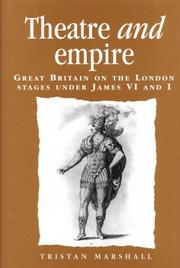| Listing 1 - 3 of 3 |
Sort by
|
Digital
Year: 1746 Publisher: Edinburgh Printed by T. Lumisden and J. Robertson, and sold at their printing-house, and by the booksellers in town
Abstract | Keywords | Export | Availability | Bookmark
 Loading...
Loading...Choose an application
- Reference Manager
- EndNote
- RefWorks (Direct export to RefWorks)

ISBN: 152613473X 9781526134738 0719057485 9780719057489 1526134748 Year: 2000 Publisher: Manchester, UK New York New York Manchester University Press Distributed exclusively in the USA by St. Martin's Press
Abstract | Keywords | Export | Availability | Bookmark
 Loading...
Loading...Choose an application
- Reference Manager
- EndNote
- RefWorks (Direct export to RefWorks)
Theatre and empire looks at the genesis of British national identity in the reign of King James VI and I. While devolution is currently decentralising Britain, this book examines how the idea of a united kingdom was created in the first place. It does this by studying two things: the political language of the King's project to replace England, Scotland and Wales with a single kingdom of Great Britain; and cultural representations of empire on the public and private stages. The book argues that between 1603 and 1625 a group of playwrights celebrated a new national consciousness in works as diverse as Middleton's Hengist, King of Kent, Rowley's The Birth of Merlin and Shakespeare's Cymbeline. Specifically Jacobean interdisciplinary studies are few compared with Elizabethan and Caroline works, but the book attempts to redress the balance by offering a fresh appraisal of James Stuart's reign. Looking at both established and little-known plays and playwrights, Theatre and empire rewrites our understanding of the political and cultural context of the Jacobean stage.
Colonies in literature. --- Imperialism in literature. --- Nationalism in literature. --- Political plays, English --- Theater --- Politics and literature --- English drama --- History and criticism. --- History --- Great Britain --- In literature. --- Historiography. --- Empire. --- England. --- English throne. --- Great Britain. --- Jacobean empire. --- Jacobean. --- King James VI. --- King James. --- London stages. --- Middleton. --- Rowley. --- Scotland. --- Shakespeare. --- Theatre. --- drama. --- dramatic material. --- early modern history. --- foreign policy. --- plays. --- political culture. --- public opinion. --- stage. --- theatre companies.
Book
ISBN: 1282946951 9786612946950 157113803X 157113378X Year: 2008 Publisher: Rochester, N.Y. : Published for the Southeastern Renaissance Conference by the Camden House,
Abstract | Keywords | Export | Availability | Bookmark
 Loading...
Loading...Choose an application
- Reference Manager
- EndNote
- RefWorks (Direct export to RefWorks)
'Renaissance Papers' collects the best essays submitted each year to the Southeastern Renaissance Conference. In the 2007 volume, two essays focus on Shakespeare's Roman plays: one on Lavinia's death and Roman suicide in 'Titus Andronicus,' the other on the rhetorical construction of masculinity in 'Julius Caesar.' Five essays address the literary implications of seventeenth-century religious belief and practice, considering the influence of the timing and delivery of sermons on John Donne, the impact of godly reforms on Thomas Browne's 'Religio Medici,' the effect of Scottish on English Presbyterianism during the 1640s, the critique of reformist utopianism in Margaret Cavendish's 'The Blazing World,' and the implications of 'Paradise Lost''s lack of a frontispiece. Two essays on sixteenth-century poetry look at the literary voices of commoners and of kings: one focuses on the portraits of women and commoners in 'A Mirror for Magistrates,' while the other examines the political implications of King James VI/I's metrical translations of David's Psalms. CONTRIBUTORS: REID BARBOUR, NORA L. CORRIGAN, WILLIAM A. COULTER, JULIE FANN, ROBERT KILGORE, SONYA FREEMAN LOFTIS, CHRISTOPHER HAIR, JIM PEARCE, and JOHN N. WALL. M. THOMAS HESTER is professor of English at North Carolina State University, and CHRISTOPHER COBB is assistant professor of English at Saint Mary's College.
Renaissance --- Civilization --- English literature --- Renaissance. --- History and criticism. --- Great Britain --- History --- Revival of letters --- History, Modern --- Civilization, Medieval --- Civilization, Modern --- Humanism --- Middle Ages --- 16th-century Poetry. --- 17th-century Religion. --- King James VI/I. --- Lavinia's Death. --- Literary Voices. --- Literature. --- Masculinity. --- Reformist Utopianism. --- Religious Belief. --- Roman Suicide. --- Shakespeare's Roman Plays.
| Listing 1 - 3 of 3 |
Sort by
|

 Search
Search Feedback
Feedback About UniCat
About UniCat  Help
Help News
News